Last week, the bill on everyone’s mind was SB1024.
Over 340 people signed up to speak at a CGA Planning & Development Committee hearing on March 15, which focused on SB1024, aka “Desegregate CT bill.” The legislation would require all Connecticut towns to change zoning to allow more multi-family housing based on the premise that it would lead to more affordable housing.
This week the bill that is top of mind is SB1068, also called the “mansion tax.”
A public hearing on Monday drew 67 people to testify.
The bill, introduced by Connecticut Democrats, proposes an additional municipal property tax assessment on towns that fail to meet the State’s 8-30g mandate that 10% of their housing stock be “Affordable” per a state formula.
Naturally occurring affordable housing does not count, such as housing provided by Greenwich Hospital or Greenwich’s private schools.
The assessment applies to residential and commercial properties with assessed value greater than $300,000 (Assessed value is 70% of market value), or a market value of more than $430,000, which would likely impact almost every property in Greenwich.
The tax would be on a sliding scale and range from 2mills for towns having less than 2% affordable units to .4mills for those having more than 8%.
The most memorable moments on March 15th came during an exchange between Rep Doug Dubitsky (R-47) and New Haven Mayor Elicker, who said, “Places like Greenwich, Woodbridge and New Canaan are using zoning to keep out communities of color.”
Afterward Elicker, a Democrat who is originally from New Canaan, declined requests from Republicans to apologize.
This week, testimony on the mansion tax will likely be remembered for an uncomfortable exchange concerning race, this time between State Rep Michael Winkler (D-56) who represents Vernon, and both State Senator Hwang and State Rep Kimberly Fiorello (R149) of Greenwich.
The moment followed a back-and-forth between Rep Winkler and Greenwich Housing Authority’s Sam Romeo, who testified there was no racism in Greenwich, and that the challenge to creating affordable housing had more to do with “land and dollars.”
“I don’t believe there’s racism in Greenwich. I’ve lived here all my life – 77 years,” Romeo said.
“Everybody is not going to like everybody, but I don’t think race is the issue. In my job as chair of the housing authority, our community is very diverse,” Romeo said.
Rep Winkler said he respectfully disagreed with Romeo about the pervasive nature of racism.
He noted the percentage of the population that is Black in Connecticut was over 10%, but the percentage of population that is Black in Greenwich is between 3.3% and 3.7%.
“How did that happen?” Winkler asked Mr. Romeo.
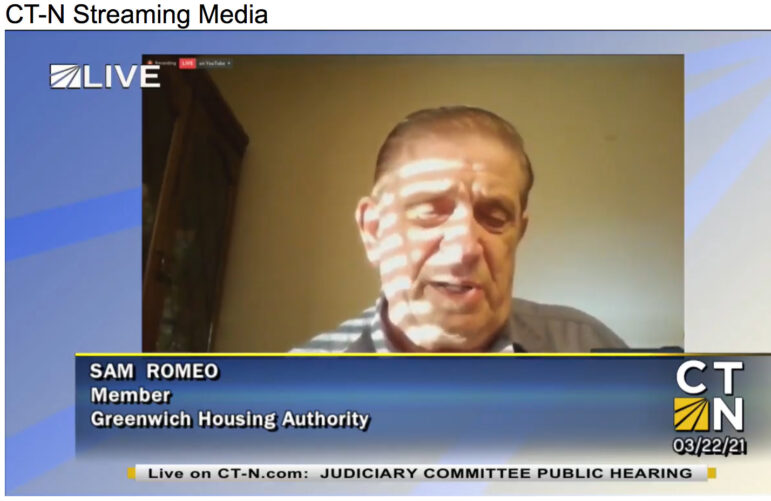
“People choose to live where choose to live,” Romeo said. “It’s not that they’re kept out. Why is the reverse true in San Diego and San Francisco, where you have more minorities than others? People go where they can afford to live and find work.”
“We’re 37% minority in the town of Greenwich,” Romeo added, though the US Census data cites it at about 27% (Black 3.7%, Asian 7.6%, two or more races 2.9%, and Hispanic 13.8%).
“Yes, you count Asians and other minorities that have never been discriminated against,” Winkler said.
The chairwoman Cristin McCarthy Vahey (D-133) asked for a pause and said, “There have been a number of minority groups who have faced discrimination over time and particularly in light of what happened in Atlanta last week.”
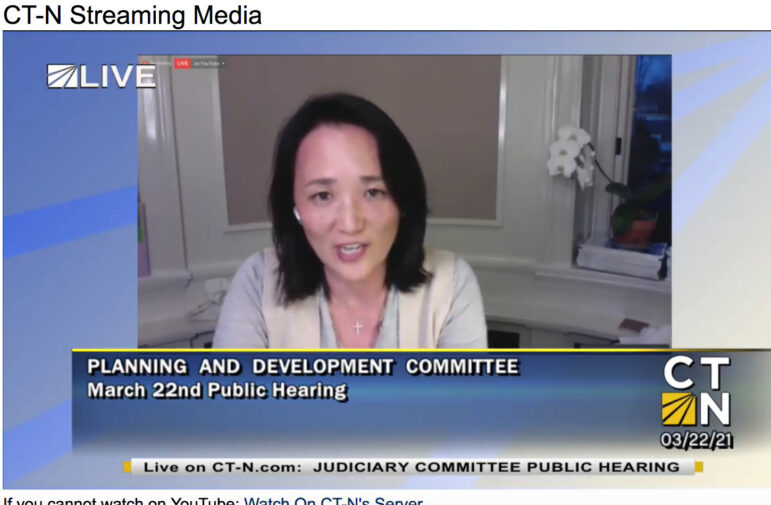
State Rep Kimberly Fiorello shook her head in response to Winkler’s comment and said, “I won’t go there.”
After Fiorello questioned Mr. Romeo for a few minutes, Senator Hwang, ranking member of the committee addressed Mr. Winkler’s comment.
“Racism exists all amongst us,” Hwang said.
While Hwang acknowledged he had left the meeting momentarily to join another meeting, but had heard about Mr. Winkler’s comment.
“For anybody who says there is no bias or racism against Asian Americans, those kind of statements are absolutely unacceptable any time. The colleague is pretty darn lucky I was not in the meeting to hear those kinds of statements,” Hwang said. “If the ignorance of my colleague to say that any racial group have not struggled with bias, prejudice is absolutely unacceptable. And if indeed a colleague said that, I demand he apologize and understand that what he said was beyond inflammatory, beyond derogatory, and beyond ignorance.”
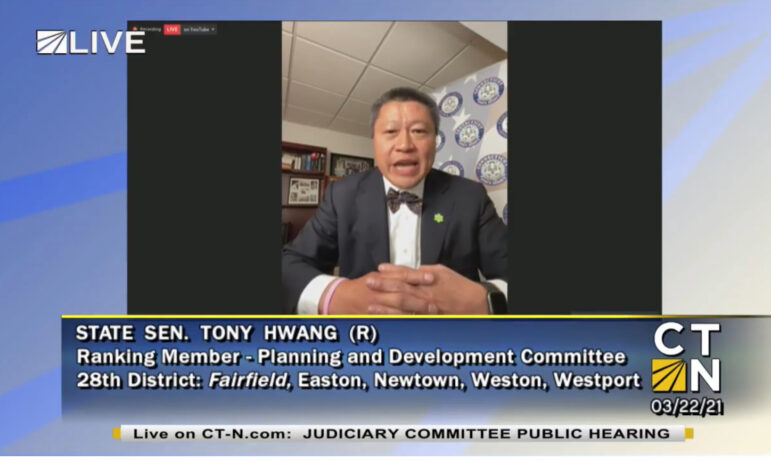
“I’m infuriated,” Hwang said.”There’s no tolerance for it, there’s no place for it.”
The timing of the remarks was remarkable given last week’s shooting rampage in Atlanta that left six Asian women dead, and the nationwide rise of anti-Asian violence and hate incidents since the start of the pandemic.
“Senator Hwang, you did not mishear it. It struck an incredible chord,” Fiorello said. “We’re speaking about structural racism, but laws that were racist have been eradicated in our country. We have multiple layers of legislation to make it so your natural rights based on your race, sex, color etc cannot be violated, but racism does exist in the hearts of people and the exchange that happened in the course of this call is an example of that.”
Winkler tried to explain his comments.
“Blacks have suffered the most,” he said. “Every immigrant group that has come in has risen through and above the Blacks, while other immigrant groups – Polish and Irish – came in and rose up, and Blacks have always been at the bottom and remained there. They are the group that I look to when I am trying to judge how well people are doing….That’s my focus. Every group has been discriminated against. My focus has been on the Blacks and I will continue to do that.”
“That doesn’t seem like an apology to me,” Hwang said. “Racism against any group – Black, Latino, Asian, religion, orientation, disability – is not acceptable, so I am just beyond appalled that you would say one is worse than the other. …I’m appalled you don’t feel a compulsion or understanding of Asian Americans you just disparaged because you feel they have not been discriminated against. You have never been in their shoes.”
Ultimately Winkler did apologize.
“I wanted to apologize. Discrimination against Asian Americans is very real. I never meant to indicate otherwise. My apologies to all I have offended,” he said.
Fiorello thanked Winkler for his apology.
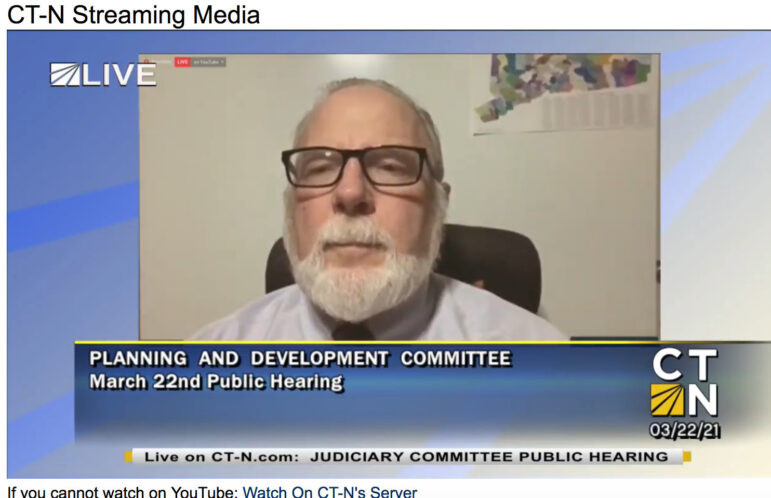
Arguments against the mansion tax were similar to the outpouring against the Desegregate CT bill, only this time, the dozens of young people who testified in support of SB1024 were absent.
(During several hours of testimony GFP watched, no one spoke in favor of the measure. In written comments published online there were 30 opposed to the bill and just one in favor.)
The tax was called punitive, regressive and Draconian.
And again it was noted the state already has a statute on the books compelling towns to create more affordable housing.
State Rep Laura Devlin (R-134) representing Fairfield and Trumbull said towns had been working hard to increase affordable housing stock.
“The 8-30g statute is so flawed,” she said. “It has created this predatory developer approach. It is bringing in loads of apartments. In the town of Fairfield we have over 700 apartments currently in development, and very few of them are designated as Affordable – most of them are market rate, making a tremendous amount of money for the developers and not really doing a whole lot for our community or solving the problem of home ownership to create inter-generational wealth.”
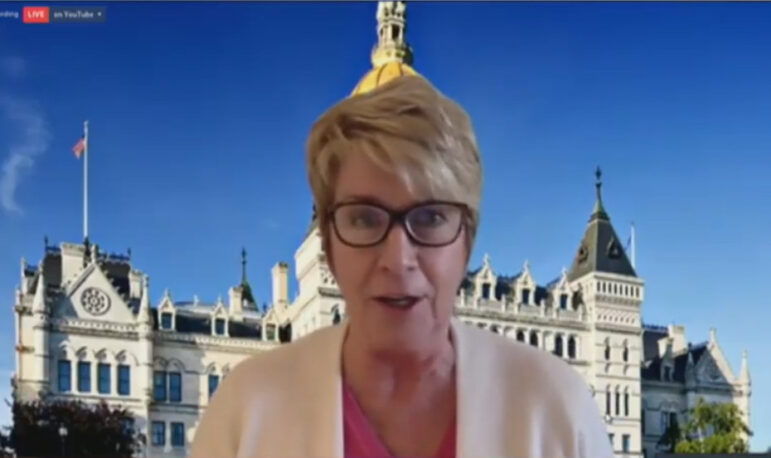
“Our state really has a spending problem,” she continued. “And to impose a new statewide property tax as a penalty to homeowners for towns that are doing a good job and working hard toward creating more affordable housing, but can’t achieve this arbitrary threshold that has been established is pretty incredible.”
“Thank you for scaring me this morning,” Hwang said.
State Rep Doug Dubitsky (R-47), who represents nine small towns in eastern Connecticut, joked that the town of Chaplin had never had so much publicity as it had in the past couple weeks.
He said developers have not been interested in building any type of housing in his town, much less interested in building deed restricted housing.
“I can’t fathom how a town like mine could essentially compel people to build this type of housing when there’s plenty of houses for sale,” Dubitsky said. “So we would would probably be taxed well over 1mill, perhaps close to 2mills, and many small towns are probably in the same situation….It does not seem like a rational way to get additional affordable housing built. It seems like a way to take more money from people.”
Charles Chiusano from Fairfield said the tax was regressive based on how high or low a town’s inventory of housing was, as defined by the state.
“I’m not against having more housing or diverse populations, but it should not be at the point of a shotgun,” he said, later adding, “We’re taxed to death.”
State Rep Tami Zawistowsk (R-61) representing Suffield, East Granby, and part of Windsor, said only 31 towns out of 169 had met the state’s 10% requirement.
“That leaves the remaining towns having to collect up to 2mills in addition to their regular taxes,” she said, agreeing with Rep Devlin that the 8-30g definition was broken.
Zawistowsk said she lives in a town of 5,300 people where across the street from her there are 150 condo/townhouse units that sell routinely for between $100,000 and $200,000 and have inexpensive rents, yet they are not counted toward the 8-30g mandate.
She noted that the legislation instructs towns to increase assessments. “But it really doesn’t say what that money is going to do,” she said. “It just says collect the money.”
There was talk about how deed restricted properties work against families who seek to build equity, grow nest eggs for retirement, and create generational wealth.
Rep Devlin said many people live in houses that have appreciated but do not have a high incomes. She said she worried about the impact of a mansion tax on the middle class.
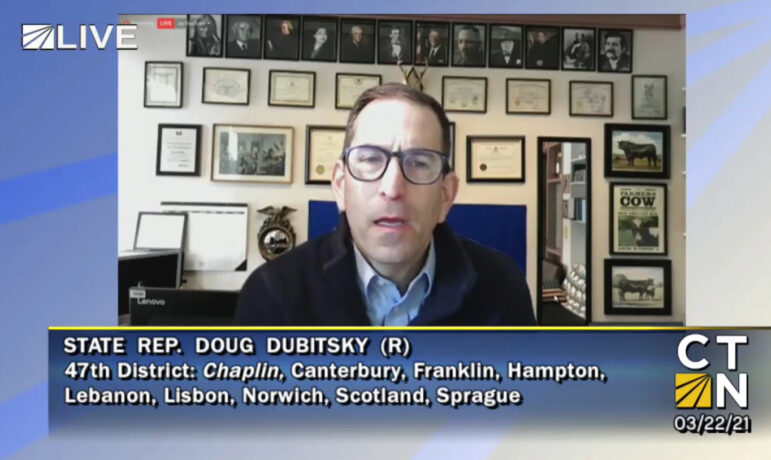
“In Fairfield County we’re under direct assault by these kinds of programs that put pressure on our middle class that make them feel like they can’t get ahead no matter what. Someone’s coming after them for this or that. Justifying it by saying, ‘Oh, it’s just the price of a cup of coffee. It’s not very much.’ It is. It adds up.”
Rep Dubitsky said he had been hearing more and more from families planning to put their homes on the market and move south in response to Connecticut’s high taxes.
Rep Devlin said she has heard the same comments in her town.
“It sends a signal to businesses that look for predictability and stability and a place they can come and grow – and we need those jobs,” Rep Devlin said. “It sends that same message to homeowners. Eleven of my friends have left the state because of the constant barrage of new taxes…At some point it is unaffordable.”
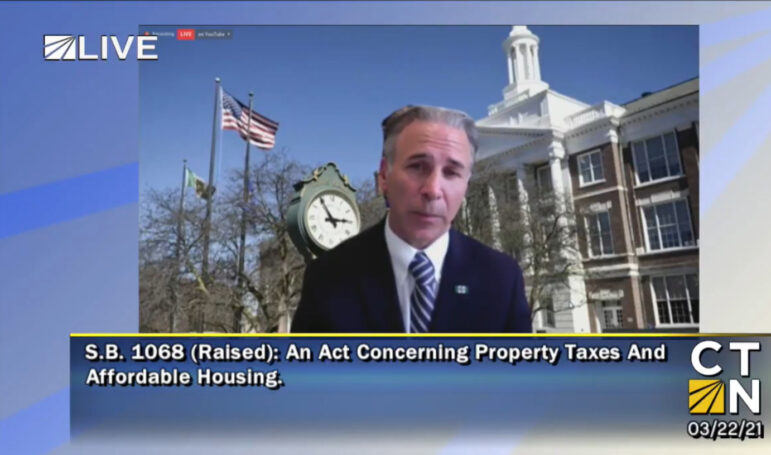
Greenwich First Selectman Fred Camillo was asked by State Rep Kimberly Fiorello about defending the middle class in the Town of Greenwich.
Camillo said POCDs feature good ideas from the citizenry. “The majority of gains we have made in this area and others have been through local initiatives, not state mandates. There’s always going to be things coming down from the state, and not all bad, but where you do the one-size-fits-all, that’s where you get into trouble.”
Camillo said Greenwich’s P&Z commission planned to present the idea of a local affordable housing trust fund later this week.
He asked that the legislature consider expanding the definition of Affordable housing to include Accessory Dwelling Units (ADUs), arguing that unless ADUs were counted toward the 8-30g mandate, that 10% goal would move further from reach.
“If you build more units, that’s 10% of a higher number,” he warned.
(ADUs are part of the SB1024 legislation. They would be “as of right” and require one parking space.)
Camillo added that there were many property owners in Greenwich who were “house rich and income poor” and that he wanted them to be able to afford to stay in town.
Fiorello pointed out that Greenwich’s proximity to New York meant land prices were very high, and asked Camillo about the impacts of high land costs on zoning.
Camillo recalled how last week Rep Lemar had said Greenwich had more zoning lawsuits against it than any other town in the state, as if to imply the town is exclusionary.
Camillo said Greenwich had not lost a lawsuit in 16 years. He said that indeed, land prices are so high in Greenwich that when a developer’s application is denied, “They go straight to court.”
“If you push these bills that are punitive, you’re going to be hurting everybody, especially the people who can least afford it,” Camillo said. “And if they can, we’ve seen now, with the remote possibilities that things like Zoom offer, that they’ll be gone, and we don’t want to lose them.”
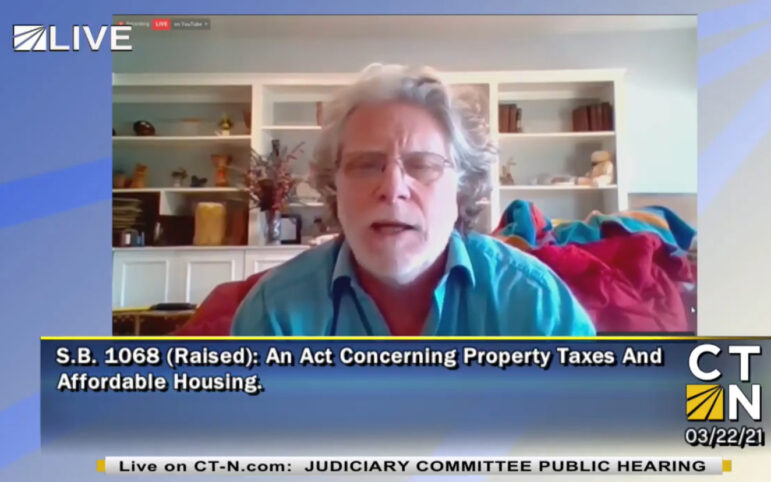
Matthew Mandell from the Westport/Weston Chamber of Commerce said predatory developers had been coming into areas where there was naturally occurring affordable housing, buying up a number of houses and then proposing 8-30g developments.
He said a developer purchased 10 small houses and seeks to tear them down and create 189 units in 5 apartment buildings in the middle of a small community.
“There’s nothing wrong with creating affordability, but it’s a matter of, How big is it, How much impact, and How does it reflect the rest of the community around it?” Mandell said. “I believe that in 1024, the same thing will happen. The developers will come in and say, ‘Look at this place. I can get this for $400,000 in Westport and turn it into four luxury condominiums and sell them for over $1million apiece.”
Mandell said communities like Westport were already working very hard to create affordability.
“We understand our obligation, and are doing it,” Mandell said. “And the state coming in and taxing us for not doing enough, or coming in and saying you should have multi family housing as of right where we think you should have it, when actually it would be completely inappropriate because of sea rise, inappropriate because of the environment, inappropriate because there isn’t infrastructure there.”
Mandell described SB1024 as Draconian and as “nothing but a developer’s bill.”
“They become the planners, not the town, not even the state. The state gives up that ability as well. You’re giving the fox the keys to the hen house. It’s not the hen house, it’s the whole farm. And it’s not just one farm, it’s 169 farms. Developers are going to be deciding where things go, and they won’t care that there’s going to be sea level rise in the future because if they can sell it in the next four years, they’re going to build it.”
Monday’s Planning & Development hearing was its last for the session.
On Tuesday, Attorney General William Tong, a Democrat, issued a statement in response to Representative Michael Winkler’s comments regarding discrimination against Asian-Americans.
“I’d like to say I cannot believe that Representative Winkler would say that Asian-Americans do not count and have not been discriminated against. Except, I can believe it because I was asked myself as a member of the House of Representatives during a debate whether Asian-Americans count as people of color. Let me assure you that Asian-Americans count and the hate and discrimination against us is real, and it has gotten people hurt and killed,” said Attorney General Tong. “The Chinese Exclusion Act was real. The forced internment of 120,000 Japanese Americans on U.S. soil was real. The beating death of Vincent Chin was real. Donald Trump’s malicious scapegoating of Asian-Americans for his own failure to respond to the coronavirus pandemic was real. The murder of six Asian women in Atlanta just last week was real. The history of bias and hate against Asian-Americans in this country is long and largely invisible, an unfortunate reality that has been highlighted by the ignorant comments made by Representative Winkler. The myth of the so-called ‘model-minority’ is a dangerous fiction that for too long has allowed this country to erase and ignore this shameful history. I invite Representative Winkler to seize this moment as a teaching opportunity, to educate himself by speaking to his Asian-American neighbors and colleagues, and to commit to joining me and others in fighting discrimination in all forms.” – William Tong
Fiorello also issued a statement on Facebook on Tuesday.
“When your thinking is race-based, you cannot help but sound bigoted. Rep Winkler, with all good intentions tried to articulate a hierarchy of victimhood among the minority races. We need policies that treat people equally, so everyone, regardless of race, can live freely and pursue their happiness. Until we are blue in the face, we have to keep repeating what Dr. King said, don’t judge by the color of one’s skin, but by the content of one’s character. It’s a mantra we need now more than ever.” – Kimberly Fiorello
See also:
CT Sweeping Zoning Legislation, SB 1024, Aims to Increase Overall Housing Supply
A Window into the Crafting of DeSegregate CT State Zoning Legislation